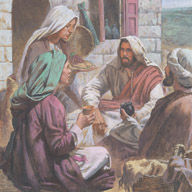No matter how many babies we added to our family, Nate’s daily office routine didn’t vary much. He left the house at 6:00 AM and walked back in at 7:00 pm, a long day (for both of us). But he was faithful never to be late coming home, almost to the minute.
My daily routine, on the other hand, was anything but consistent. One evening when I was especially frazzled, I asked Nate if he’d be willing to give me a gift. He answered carefully: “What might that be?”
“For you to stay home 30 minutes longer every morning so I can take a walk.”
I desperately needed alone-time to think, pray and gather courage for each day. The kids began waking around 6:00, so someone needed to be there.
Nate answered quickly. “OK, but I absolutely have to leave by 6:30 to get to my desk when I should.” His commute was a drive to the Metra station in the next suburb, a park-and-walk, a 45 minute train ride, then a 1½ mile walk to the other side of the Loop.
The next morning and every day after that for several years, I walked out the door at 5:45 AM and back in at 6:30. The few times I was late in returning, I’d pass Nate on the road. (He didn’t dare give me a schedule-inch, knowing I’d take a mile.)
Some days I hoofed it and covered a great distance. Others were more of a meander. If it was raining, I wore a hood and took my chances with the lightning. A foot of snow didn’t keep me home and neither did 22 degrees below zero. That 45 minutes meant everything.
Nate never reneged on his word and never complained about my rearranging his life. This impressed me, since I knew he didn’t understand the depth of my need. He did understand the walk was important to me, and because of that, it became important to him, and he sacrificed to make it happen.
Nate did a good job satisfying my need, but the #1 Need-Meeter is God. He watches us carefully, monitoring what’s important and what’s not. Then he sets to meeting what he considers to be a need.
The system doesn’t work, however, unless we agree to his definition and his way to handle it. We don’t always need to get into that college, get that specific job or marry that certain person. We don’t always need healing or even continued life on this earth. What we do need is unshakeable confidence that God’s assessment of what we need is flawless.
As our 7 children grew and the “baby” went to school, my need for the pre-dawn alone-time evaporated. Nate didn’t say, “Finally I can leave when I want!” He just said, “OK.” His definition of that gift would have been “30 minutes daily.” My definition was, “a sacrificial love willing to meet my need.”
In doing that, he’d imitated our loving, need-meeting God.
“Let your compassion [Lord], quickly meet our needs, for we are on the brink of despair.” (Psalm 79:8)




